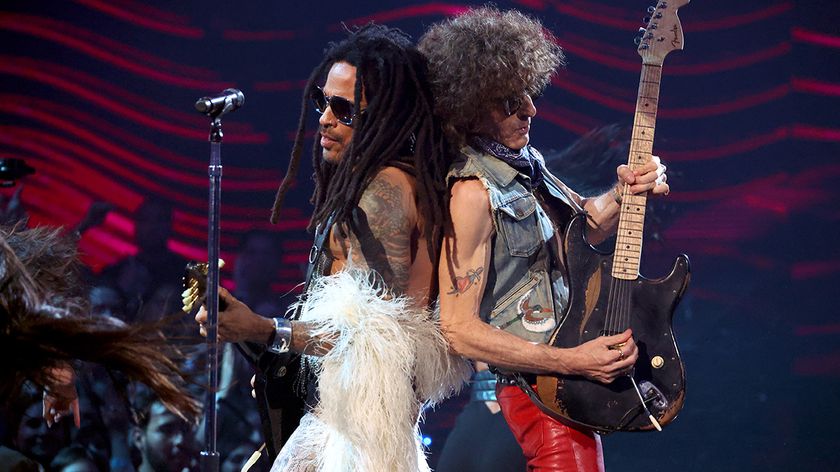Interview: Asking Alexandria

Hooking up with groupies, drinking mass quantities of alcohol and stopping cocaine-sniffing drug dogs in their tracks at international airports are part and parcel of Asking Alexandria’s lifestyle.
But while there’s no question that the fast-rising electro-tinged metalcore band loves to party, its formidable work ethic eclipses its hedonistic exploits.
Over the past 21 months, the British quintet has issued three releases: the wildly eclectic 2009 breakthrough album, Stand Up and Scream; the schizophrenic 2010 EP Life Gone Wild, which includes two faithful Skid Row covers; and its latest disc, the darker, more cohesive full-length Reckless and Relentless.
The new album capitalizes on the strengths of Stand Up and Scream while eschewing techno interludes in favor of more-accessible choruses and menacing industrial keyboards. The abrupt shifts between Asking Alexandria’s atonal breakdowns, twin-guitar harmonies and euphoric choruses might seem carefully planned and executed, but guitarist and primary songwriter Ben Bruce insists the band’s greatest strengths are its spontaneity and desire for self-satisfaction.
“If we stopped for a minute to evaluate what we’re doing, we’d probably second-guess ourselves, and that would be disastrous,” says Bruce, sitting on one of two double beds in the band’s room at the Comfort Inn, two blocks from Manhattan’s Times Square. “We’re all about going with the flow, working quickly and doing what we like to hear as opposed to what we think people want to hear from us.”
Clearly, Asking Alexandria are doing something right. Their video for Stand Up and Scream’s “The Final Episode” has been viewed nearly eight million times on YouTube, and the track “A Single Moment of Sincerity” has accrued more than 2.7 million plays on the band’s MySpace page. At this point, it seems nothing short of self-implosion will slow them down.
Of course, there is always that danger. In past interviews, Bruce has complained about vocalist Danny Worsnop’s inability to carry a melody when he’s too wasted. At the group’s March 29 show in Seattle, Worsnop’s problems became very public when he bantered belligerently and incoherently with the crowd, which replied by chanting, “Drunk piece of shit!”
Get The Pick Newsletter
All the latest guitar news, interviews, lessons, reviews, deals and more, direct to your inbox!
Bruce took the mic and addressed Worsnop’s drinking problem head on, asking the crowd, “Who here will support us in putting my best friend through rehab and making him better?” After the show, Asking Alexandria posted a lengthy apology on their Facebook page. The next day, Worsnop posted his own response on Twitter through multiple messages, stating, “I officially am quitting drugs and getting drunk here and now.”
It’s unlikely Asking Alexandria will lose momentum even if Worsnop heads off to rehab for a spell. They’ve earned a loyal following by touring nonstop, hanging out with their fans after shows and communicating with them over the internet; an absence caused by Worsnop’s substance abuse might only cause their audience to care about them more.
Asking Alexandria are today’s youth gone wild. They’re charismatic, funny and rebellious, but more importantly, their fans believe in them because Asking Alexandria believe in themselves. They’re driven by their collective influences — from deathcore to emo — and they integrate them into songs that thrive with energy and diversity.
“Breathless” and “A Lesson Never Learned,” for example, are propelled by roaring, staccato, alternate-picked guitars reminiscent of Suicide Silence and Meshuggah, harmonized guitar licks that recall Killswitch Engage, harrowing Marilyn Manson–like synth squalls and vocals that are equal parts Black Dahlia Murder and My Chemical Romance. And “Morte et Dabo” features a haunting choir, horror-film sound effects, sinister Job for a Cowboy–style death metal riffs, Skinny Puppy-esque keys and a pop chorus that could be Blink-182.
“It kind of gets me down that people are so narrow-minded that they can’t open their mind a little bit to try and experience and enjoy new genres,” Bruce says a week before Worsnop’s meltdown.
“My favorite guitarists are Eric Clapton and Gary Moore, and I fucking love Bruno Mars. People are like, ‘That faggot, he’s a gay pop singer,’ but he’s a really talented musician. His voice is incredible. Why would I not appreciate and enjoy what he’s doing?”
Some 20 minutes into the conversation, Bruce is on a roll, despite the fact that Asking Alexandria have just come in on an overnight flight from Australia and had to wait for five hours before they could check into their hotel. Bruce claims they haven’t had a full night’s sleep in 50 hours. Nonetheless, he’s witty, impish and so chatty that rhythm guitarist Cameron Liddell practically catches a catnap during the interview.
The way Bruce sees it, there will be plenty of time to rest later, after Asking Alexandria have become superstars. The guitarist developed his unquenchable drive and tireless work ethic at an early age. Bruce was born in Wandsworth, London, but when he was six the U.K. economy took a downturn, and his dad, who worked in advertising, moved the family to Dubai, United Arab Emirates.

At 11, his father bought him a cheap guitar, and Bruce immediately took to the instrument. A few years later, he got together with some local friends and formed the band Amongst Us, followed by End of Reason.
In 2006, he put together the original lineup of Asking Alexandria, and a year later the group put out the album The Irony of Your Perfection, which featured twin guitar lines redolent of Iron Maiden, screamo vocals and nary a breakdown in sight. “We were just a shitty local band having fun,” Bruce says. “I kept the band name because I liked it, but I’m the only original member.”
Realizing he would never achieve international recognition in Dubai, Bruce moved on his own to Nottingham, England, in 2008, and after searching the internet for musicians found guitarist Danny Worsnop. The two hit it off. Bruce moved into Worsnop’s flat in York, and they started working on material Bruce had written in Dubai.
The duo recruited Worsnop’s friend James Cassells to track drums for a rough demo, then convinced Cassells to leave his band, Nailbed, and join them in the revamped Asking Alexandria. The drummer agreed but suggested they bring in Nailbed guitarist Cameron Liddell, whose downtuned guitars and rapid, percussive rhythm style has had a substantial impact on Asking Alexandria’s sound.
“We come from really different places as players,” Liddell says during one of Bruce’s rare moments of silence. “I learned from listening to things like Slipknot and As I Lay Dying. I was really into heavy rhythmic breakdown patterns and playing as hard as I could.”
”Unlike their peers, whose albums are often muddy or tinny, Asking Alexandria make recordings that are as tight and clean as Nickelback singles. This is one reason why their music has such appeal. Credit for that goes to producer Joey Sturgis (The Devil Wears Prada, Attack Attack!).
The band hooked up with him after sending a rough demo to Craig Ericson, Sturgis’ studio manager and the founder of Rise Records. Sturgis agreed to produce a more professional demo, and Asking Alexandria packed up their gear and flew to Foundation Recording Studio in Connersville, Indiana.
“We had never played a show together or anything,” Bruce says. “We just said, ‘Fuck it, let’s do this,’ and we recorded three songs with Joey. We put them on our MySpace page, and right away people were blown away that there was this professional-sounding band up there. Suddenly, we started getting 2,000 plays a day out of nowhere.”
Impressed by the band’s sound and the rapid growth of its fan base, six labels contacted Asking Alexandria. Ultimately, the group signed with Sumerian, which put it right back in the studio with Sturgis for another few weeks. The result was Stand Up and Scream, an album that features pulverizing rhythms, infectious refrains and lots of mosh-worthy breakdowns.
In addition to producing the songs, Sturgis helped Asking Alexandria program the abundant techno passages that bridged the breakdowns and lightened the tone of the album. Before Stand Up and Scream was released, the young Englishmen hit the road in a Winnebago and performed anywhere they could book a show.
“We played Chuck E. Cheese’s and gymnasiums,” Bruce says, wincing at the memory. “We lived in Walmart parking lots for a few months. We had to wait for the store to open before we could shit, piss or brush our teeth. Sometimes, we’d wake up with police banging on the door telling us to leave, so we’d drive around and come back later or find a new Walmart.”
While Asking Alexandria’s earliest shows were sparsely attended, they gave the band the opportunity to fine-tune its performance and add some visual flair. The onstage antics included Bruce flipping his guitar completely over his head and around his body while still wearing the strap — a trick he learned from Slipknot’s Jim Root — and a spread-legged, bent-knee dance that got the band pegged with the label “crabcore,” a tag that has also been applied to Attack Attack!

“We were trying to find a place, figuring out who we were, and we briefly had this stupid image, which I fucking hate,” Bruce says. “I think we’ve totally moved on since then.”
Bruce wrote parts for Reckless and Relentless while Asking Alexandria were on the road for Stand Up and Scream, but the bulk of the material was composed over six weeks in a New Jersey practice room in early 2010. The sessions were productive, but they were also stressful, a situation that the band remedied by drinking on the job.
“Two days in, we sat down and looked around the room, and there was literally over 100 empty beer bottles, five bottles of wine and liquor bottles everywhere,” Bruce says. “We were like, ‘Wow, we need to take this seriously and slow down.’ So we sobered up and started writing the next day, and there was nothing — no juice, no inspiration to write anything. So we had to get pissed again and wreck our livers in order to write this album. I think alcohol makes us more honest and more confident so we’re not afraid to try stuff. And I think that’s why it worked so well for us.”
In June, Asking Alexandria returned to Sturgis’ studio in Indiana. As with Stand Up and Scream, Cassells tracked the drums to Bruce’s scratch tracks, then Bruce recorded all the guitar rhythms and leads as well as the bass before Worsnop laid down the vocals. “It’s just something we do for convenience,” Bruce explains. “I had a studio in Dubai, so I’m really used to recording, and it’s just quicker if I do it all myself.”
On Stand Up and Scream, all the guitars were recorded in drop D. For the new album, Bruce lowered the tuning to drop C for extra rumble and played custom Ibanez guitars with Dunlop heavy-gauge strings. He plugged into a Peavey 6505 Plus head and used the amp’s natural distortion (Bruce and Liddell use the same guitar and amp setup on tour, but Liddell uses an MXR distortion pedal).
Bruce hopes to emulate some of the studio effects on Reckless and Relentless with Line 6 pedals. The only hitch in the recording process came in August when Worsnop blew out his voice screaming. After he recovered, Asking Alexandria toured for another two months, and in November, Worsnop went back to Indiana to record the vocals.
His vocal trauma wasn’t the band’s only mishap. In late February 2011, moments after stepping off a plane in Australia for a six-date tour, Bruce had an experience that could have derailed Asking Alexandria. “A sniffing dog came and sat in front of me, and I was like, ‘Oh, he’s my friend now,’ so I was stroking the dog, and these agents at the airport said, ‘Don’t touch the dog’ and whisked me off.”
In a private room, away from his bandmates, Bruce was subjected to an intense police interrogation that stopped just short of a full body search. “They said, ‘Do you do drugs?’ and I was like, ‘No,’ and they said, ‘We’re not stupid. Do you do drugs?’ I kept saying no, and then they searched my stuff and found traces of cocaine all over my laptop. I thought i was going to jail for life.
"They said, ‘Show me your arms. Do you do heroin?’ I showed them my arms. I have scarring in the worst places because of how my tattoos healed, so they thought I was an addict.”
Unable to find drugs in Bruce’s bags, the police eventually let him go after taunting and threatening him for hours. “I was relieved, of course,” Bruce says. “But there was a part of me that wished I had a couple joints or something. It would have made for great press.
Photos: Paul Harries
Jon is an author, journalist, and podcaster who recently wrote and hosted the first 12-episode season of the acclaimed Backstaged: The Devil in Metal, an exclusive from Diversion Podcasts/iHeart. He is also the primary author of the popular Louder Than Hell: The Definitive Oral History of Metal and the sole author of Raising Hell: Backstage Tales From the Lives of Metal Legends. In addition, he co-wrote I'm the Man: The Story of That Guy From Anthrax (with Scott Ian), Ministry: The Lost Gospels According to Al Jourgensen (with Al Jourgensen), and My Riot: Agnostic Front, Grit, Guts & Glory (with Roger Miret). Wiederhorn has worked on staff as an associate editor for Rolling Stone, Executive Editor of Guitar Magazine, and senior writer for MTV News. His work has also appeared in Spin, Entertainment Weekly, Yahoo.com, Revolver, Inked, Loudwire.com and other publications and websites.

“We had 15 minutes left, and it was time to go… I just started playing that riff. Then Lenny goes, ‘Whoa, what’s that?’” Lenny Kravitz guitarist Craig Ross reveals the serendipitous roots of a Kravitz classic

“The concept of the guitar duel at the end was just appalling”: Crossroads is an essential piece of '80s guitar lore, but not every guitar legend was a fan of the film









